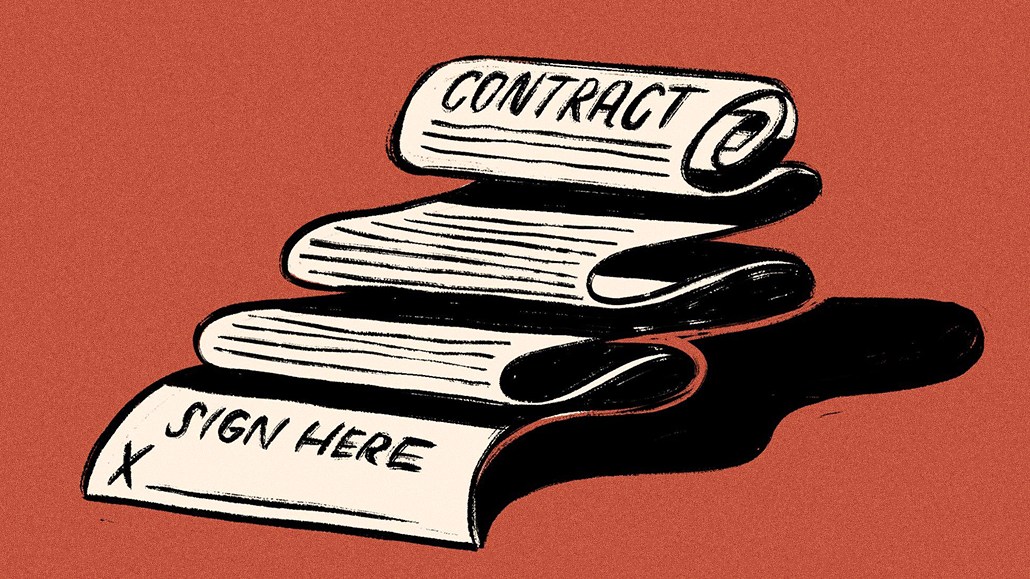Secure your place at the Digiday Media Buying Summit in Nashville, March 2-4
A principal media side-effect: avoiding the word ‘agency’ in contracts with clients

Much has been written in the last year about how principal media has grown in use among major holding company agencies — and how little clients seem to know about the practice. Even though it’s been going on for years, the topic has grabbed headlines as it has had a significant role in profit generation for some of the leading holding companies.
One overlooked aspect — but symbolically important — is the increasing avoidance of the word “agency” in contracts being struck between those agencies and clients, according to five people who spoke to Digiday for this story.
The pursuit of principal media has ended up affecting how holding company agencies draft contracts with sizable clients, said Steve Boehler, who runs agency consultancy Mercer Island Group. Agencies that buy inventory directly from media sellers, then sell that inventory to its clients, are in effect no longer working as agents for those clients, he and many others argue.
“Legally, contractually, most of the big media contracts have gotten rid of the word ‘agent,’” said Boehler. “They can’t have that word in there if there’s a principal buying aspect of the program … They can’t say they’re the agent if they’re doing principal buying.”
Another media consultant who spoke on condition of anonymity, said he’s seen this happening more frequently in the last year. Publicis and Omnicom representatives declined to comment for this story.
A source with knowledge of Publicis’ practices explained that principal buying at Publicis is done through a firm called Apex, which is a separate entity that operates independently of the media agencies and their investment teams — the source said has clear firewalls in place. “We don’t (nor have we ever) categorize our principal buying as an ‘agency’ because agency connotes acting as an ‘agent’ for the client. When we are acting as principal this is not the case, so we contractually delineate that we are acting as principal instead of agent. This is both for transparency and compliance.”
That explanation jibes with what the consultant explained as the main distinction: if an agency is an “agent”, the client has liability for media costs — i.e. if they don’t pay the agency and the vendor doesn’t get paid, the advertiser is liable for those costs. With principal buying, the agency has liability for media costs — i.e. if the advertiser doesn’t pay them, they are still liable to the vendor.
“The consequence is, if the agency acts as principal and there are no clauses on transparency, AVBs [agency volume bonuses, less elegantly known as kickbacks], billing differences etc., the agency is legally entitled to those benefits/differences,” said the consultant.
But there remain bumps in the road on establishing clarity in contracts, said the consultant. “We’ve seen a few contracts recently where the language is causing confusion between being a principal at law (which is the invoicing liability point), and principal media (which are two different things) — clients have had to clarify that. And language was updated to make sure the transparency etc. provisions still apply.”
Boehler, who has been a vocal advocate for independent agencies that don’t find themselves in what he considers a conflicted position, posted the following question on LinkedIn on Monday: “Will clients care that the biggest media agencies are evolving to essentially be sales reps for big media?”
That really is the big question. Clients generally convey the sense that if they know about the practice, and it’s getting them decent rates for inventory, they don’t have a problem with it. The trouble lies when media agencies don’t disclose their use of principal buying — or when clients aren’t made fully aware of the practice. The ANA dug into the issue nearly a year ago with a report on the practice.
“As a client, I need to make sure that my interests are protected, and the best time to get all of this done is when you’re starting a new relationship with the agency,” Yogi Jashnani, CRO for trampoline park chain Sky Zone, told Digiday last November.
In other words, when contracts are hammered out.
More in Media Buying

Omnicom’s lack of surprises in its 2025 earnings is both a good and bad thing
Results were neither spectacularly good nor terribly bad, with 2025 revenue up 10%, thanks in part to including one month of revenue from Interpublic Group

How the MLS plans to convert World Cup interest into lasting soccer fandom
Alongside advertisers and publishers, the league hopes to use a rare opportunity to promote soccer in the U.S.

AdCP vs. IAB Tech Lab: Inside programmatic advertising’s agentic AI standards showdown
Ad Context Protocol and IAB Tech Lab’s Agentic Roadmap offer two competing approaches for updating ad tech for AI agents. Can they coexist?







